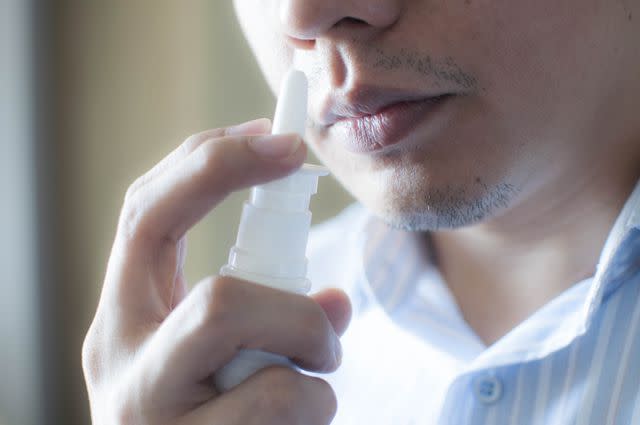Can I Use Nasal Sprays Like Flonase for a Cold?
Medically reviewed by Farah Khan, MD
Flonase (fluticasone) does not work for the common cold. As a corticosteroid nasal spray, Flonase is a popular over-the-counter (OTC) allergy medication that can relieve an itchy and runny nose triggered by an allergen. Though a cold may cause similar symptoms, the nasal spray isn't effective when the problem is due to a cold.
This article discusses when to use Flonase and how to treat allergies and colds.

How Flonase Treats Allergies
Corticosteroid nasal sprays like Flonase block the inflammatory agents that your body produces in response to an allergen, a substance that causes an allergic reaction.
Specifically, they reduce the formation of inflammatory mediators (like cytokines and enzymes) produced by nasal epithelial cells and various allergic cells, such as eosinophils and mast cells. These substances cause the itchy, watery eyes, runny nose, and sneezing you typically experience with an allergy.
By blocking the production of these substances, Flonase and other corticosteroid nasal sprays prevent or reduce these allergy symptoms.
Antihistamines can also work very well for allergy symptoms.
Takeaway
If you have been using OTC products but still have symptoms, contact your healthcare provider or allergist for further treatment options.
Corticosteroids and Cold Symptoms
When you have a runny nose caused by a cold, excess mucus builds up in your sinuses due to swelling and your body's attempt to eliminate the invading germs.
Viral infections cause inflammation—but it's different than allergic inflammation. Nasal corticosteroids may help reduce this inflammation but they're not expressly indicated for this reason.
Several medical studies have investigated the use of corticosteroids to treat cold symptoms. Research results do not support using these medications for symptomatic relief, but the authors suggest that more research is needed.
Explainer
Studies have found that physical interventions such as handwashing are beneficial when you have a cold. A review of eight studies found handwashing decreased respiratory diseases such as colds by 16%–21%.
How to Treat Cold Symptoms
If you have a cold, try OTC medications (such as cough or cold medicines and pain relievers) to treat the symptoms you have. Nasal decongestant sprays may also help relieve nasal congestion and pressure. Look for products that list oxymetazoline as the active ingredient. Brands include Afrin, Dristan, Mucinex, and Zicam.
You can also use a humidifier, rinse your sinuses, or take a steamy shower to treat your cold symptoms at home.
Additionally, zinc supplements may help shorten the length of a cold. A review of seven clinical trials with 575 participants found zinc lozenges shortened the length of cold symptoms by about 33%.
However, other treatments, including ginseng, echinacea, and vitamin C supplementation, are not likely to provide a benefit.
Oral antihistamines also don't help with cold symptoms. These drugs don't treat congestion, a runny nose, or watery eyes caused by colds, the flu, or other viral illnesses. However, they are often included in multisymptom cold medications.
How to Tell if You Have Allergies or a Cold
If you start to feel symptoms such as a runny nose or stuffy head, try to determine whether your symptoms are caused by a cold or allergies.
Though they can seem similar, there are a few characteristics that distinguish one from the other:
Likely a Cold
Productive cough
Yellow or green nasal discharge
Fever
Likely Allergies
Dry cough
Clear nasal discharge
Itchy eyes/nose/throat
Summary
Flonase and other nasal spray corticosteroids do not treat colds. These medications treat itchy and runny noses due to allergies, but will not relieve symptoms caused by a common cold. Instead, use OTC cough and cold medicines and pain relievers to treat cold symptoms. If OTC products aren't treating your symptoms, contact your healthcare provider for further treatment options.
Read the original article on Verywell Health.
